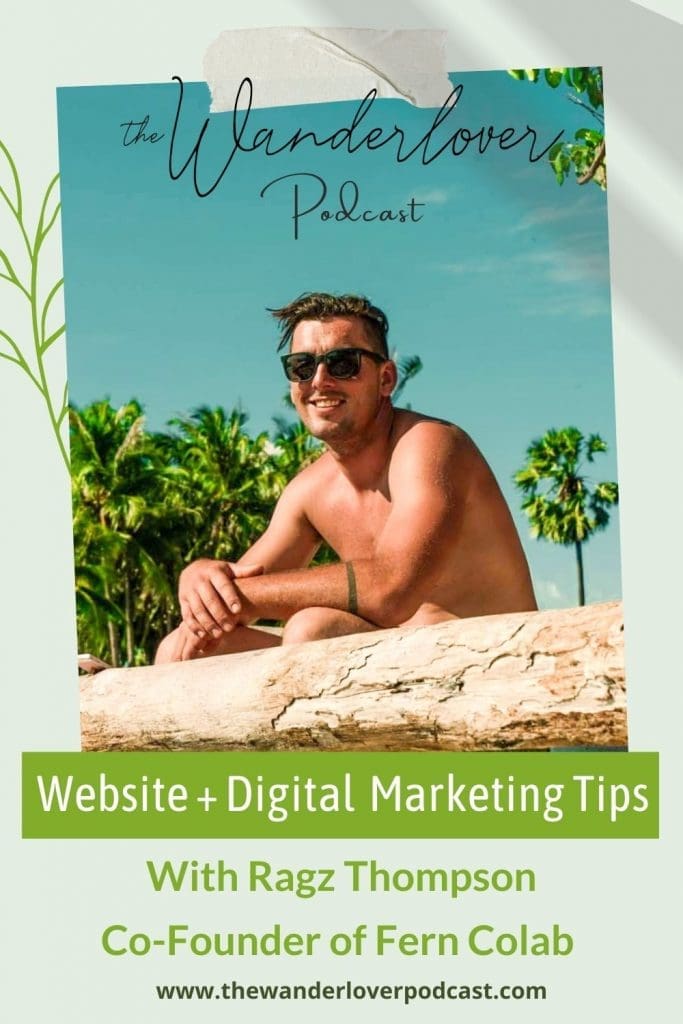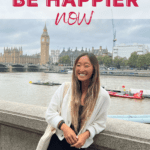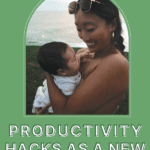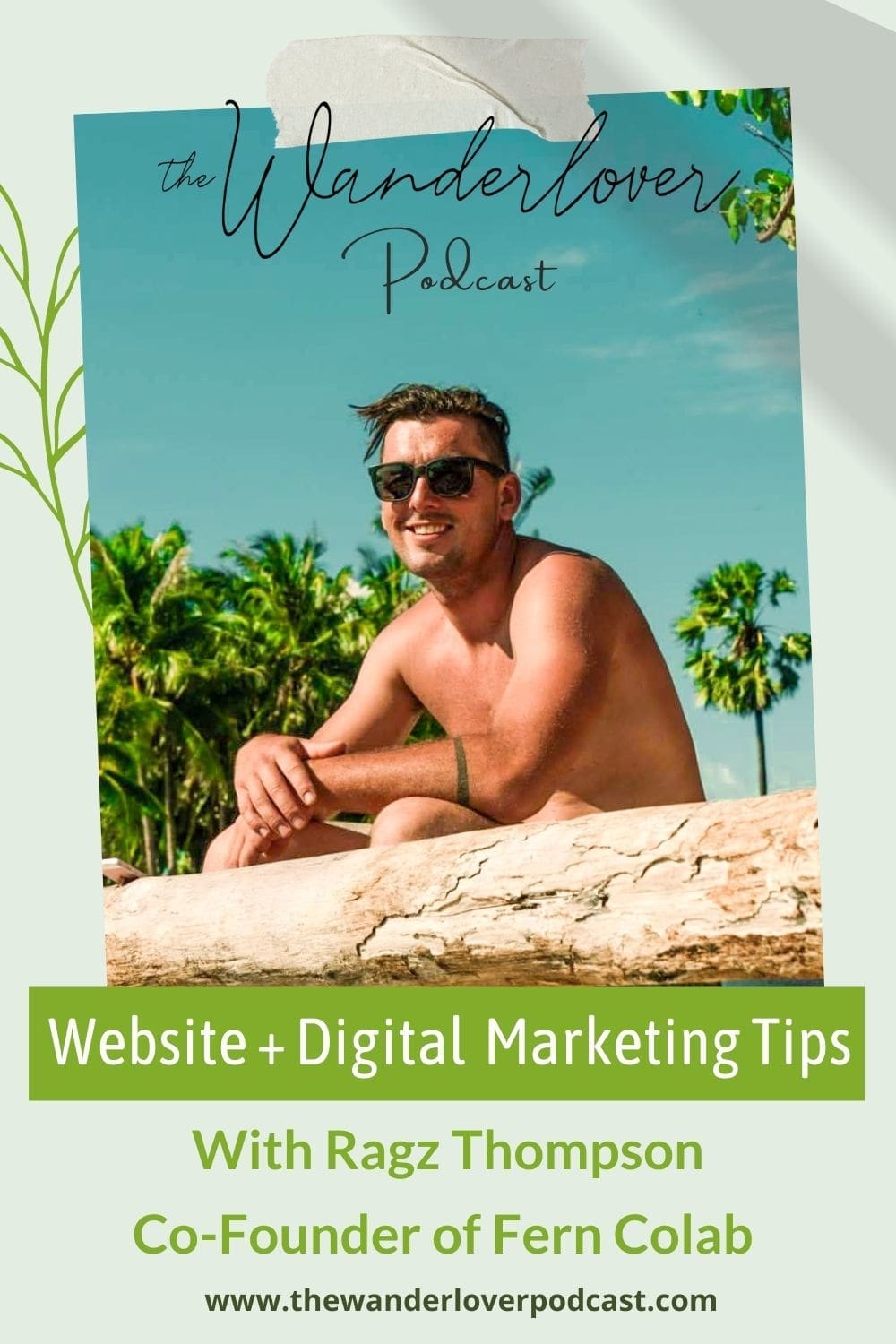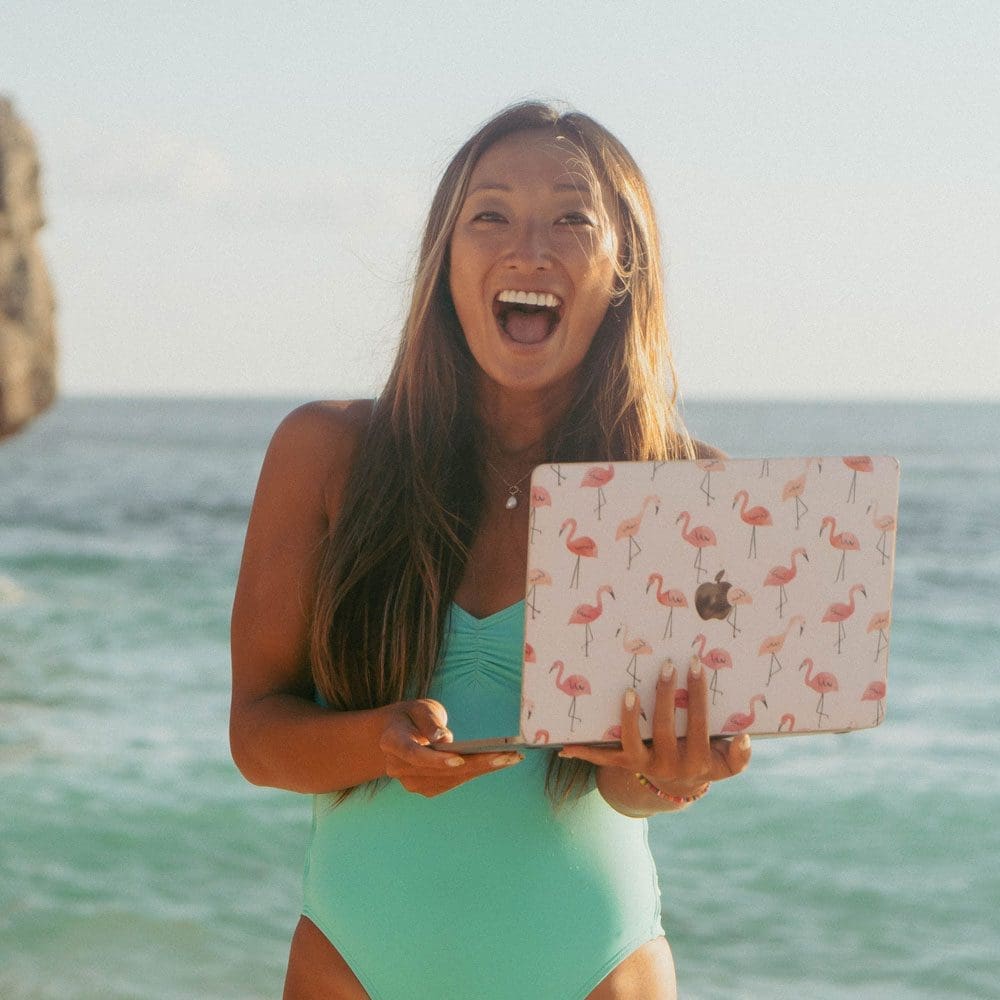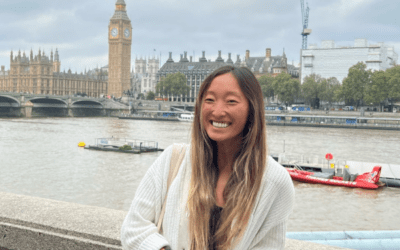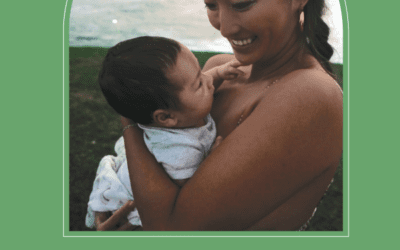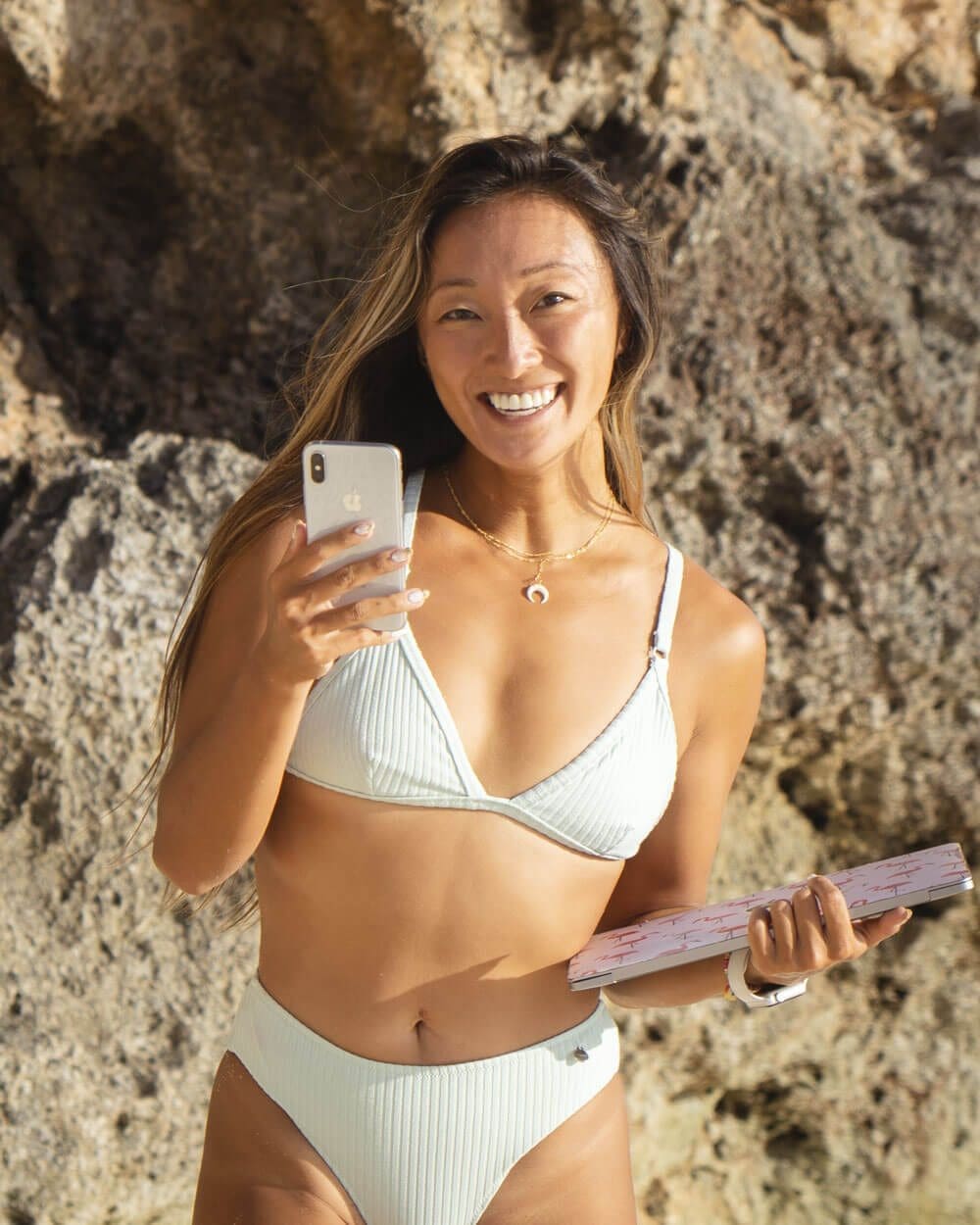Our guest this week covers everything you need to know about representing your business in the online digital space. From common website design mistakes (5:15) to SEO optimisation (15:37) and conversion based digital marketing (23:50) this is an episode jam packed with useful information that you will want to take notes on!
Quick Links
✧ Join the Digital Nomad Society for Just $7/Month
✧ Follow The Wanderlover Podcast on Instagram
Audio Transcript
Danielle (1m 37s):
Hi everyone! Welcome back to The Wanderlover Podcast. I’m really excited to be back here this week with my boyfriend Ragz Thompson, Co-Founder of Fern Colab. He is an expert when it comes to web design, SEO and digital marketing, and basically runs all the tech and web presence of The Wanderlover. I wanted to pick his brain today about best practices when it comes to your website and marketing for all of you listening, so here we are. Welcome back to the podcast, Ragz!
Ragz (2m 5s):
Hi everyone! Thanks for having us back.
Danielle (2m 8s):
We’re so happy that you are here. So to start, what exactly is Fern Colab?
Ragz (2m 14s):
Fern Colab’s a full funnel digital marketing agency and an award-winning creative studio. We help brands and businesses build their brands, tell their stories and reach their audiences online.
Danielle (2m 28s):
Especially in this day and age guys, freedom through entrepreneurship. So Ragz and I are currently in Rote recording this. We’ve been traveling nonstop for the past month and we’re able to do so because of our online businesses. So as a digital marketing and creative expert, what would you say is the main reason why everyone needs a website?
Ragz (2m 53s):
There’s a couple of reasons, really. I mean, you can go on all day. Credibility, leads, organic traffic, and digital marketing opportunities. That’s kind of like how we categorize like our main opportunities in web. So when you look at credibility, I guess you could say it was probably one of the main reasons you want to have a website for your business. Chances are that has several providers offering similar services to yours and you need to stand out and have a website that looks really great. It communicates clearly like your quality of service. And, you know, you portray what you’re doing to your consumers. If you are trying to do that without a website, it’s easy to question legitimacy of the business.
Typically you would hear of a name and you know, you’re going to go to Google and you’re going to research that business. And if you find nothing about it and you don’t have a website, you’re not going to be convinced that it’s a serious thing, right?
Danielle (3m 52s):
Yeah. It kind of like having a restaurant without a storefront or in the online space. A website is basically like a storefront for whatever it is that you’re offering, whether it’s physical products, whether it’s services, but think of it as this really credible branded experience where people can learn more about you and ultimately buy or purchase.
Ragz (4m 14s):
Yeah. And it gives people the comfort that you’re a real business. When you pop up on Google, you go, oh, okay. I can take these people quite seriously now. Yeah. And then on from there, like obviously your branding, your website is a powerful brand tool because it gives you the platform to showcase what you do, who you are, what you represent and what you stand for. And, you know, once you can do that, you increase your chances of customers buying from you because you can connect and you can portray your messages quite clearly, that generates you leads. And once people find your business online, they become interested in your product or service. They want to know more. They’re going to look for ways to contact you and find the information and, you know, they want to answer their questions.
Ragz (4m 55s):
So your website becomes the place that they can do that.
Danielle (4m 58s):
Yeah. And it’s just really powerful because it’s yours. It’s an asset for your online business. And I remember when I first started with my website, I just had no idea. You, you always hear about having a really professional website, having a website that’s searchable, that’s optimized. But when you’re first starting, like all of this, they’re just buzzwords. Right. So I want to ask, what do you see are maybe like common mistakes from people who are just starting out self building their own websites they’re diving in and trying to learn as much as they can, but it’s just so much information online. What do you see are really common mistakes for those of our listeners who are just starting out?
Ragz (5m 40s):
Sure. Yeah. That’s, there’s a lot of stuff to take into account with websites. Of course. So I guess number one would be people trying to break design norms, going too far with certain design elements. You know, like you, you learn about a page builder and it gets very exciting. You start creating new menus and pop-ups and menus that kind of slide across the screen. And like we often find that it’s just quite damaging to a website, you know? So people tend, when you go onto a website, there’s a procedure that happens. For example, you’ll always look to the top, right. To find a menu or the top left to find your main logo. Right. And your main logo typically links back to your homepage.
Ragz (6m 21s):
And yeah, one of those, one of the issues is designing. You know, like if you’re not a designer, it can get a little bit overwhelming and you get led down a route of being too, too fancy in a way, you know, like just keep things really simple. That would, I guess it could be part of then your brand identity, you know, like you’ve got this brand that you’re working on, you should have your kind of your colors and your fonts and your messages is messaging down. So what we see a lot of is on websites, it’s easy to get carried away with like creative elements, you know, and what happens is you end up using too many colors or too many fonts using different templates that are available to you.
Ragz (7m 2s):
And like your actual brand visuals get diluted. Then across our website, you know, you start using incorrect images, you start having fonts that you’ve never used anywhere else. And so you might see a print document or an advert somewhere, then you land on our website and all the colors are different. It’s distract, distracts from your brand. So you can’t necessarily see who this belongs to. And then I guess another one would be the image images used on a website and the quality of them and the style of images. It’s really important to have the right type of images on your website. Isn’t it? You know, when you, if you were landing on a website and you can see that it’s clearly stock photography and it’s a bit it’s unrelated, you know, like it’s, you’re going to kind of end up getting confused by what this page is trying to tell you, you know, like you’ve got a picture of three people and a dog on it, and you’re talking about business, you know, like it’s not necessarily selling your product or service.
Ragz (7m 58s):
And one client that we had recently is a pump manufacturer, but they’re the heading picture was a beach scape. You know, it was just a beach. And it’s like, well, this isn’t doing anything for my brand. This is distracting. You know, like, who is this? And what is their message?
Danielle (8m 13s):
Yeah. And many times when you’re just starting out and you don’t have that top-down view or a view from your audience member, from the client experience. And you’re just really working into the day and day and the nitty gritty, you don’t see how your messaging and your branding and your photos can be off. Right. And that’s where you come in, because from your experience, you can really see, oh my gosh, this user is so confused. It’s like, what am I seeing on this website? And so what do you think our optimizations hips, what advice do you have to optimize right now?
Ragz (8m 49s):
Well, if we were going off those, those kinds of like three main points, we can look at images and optimization tips would be getting, like getting the images that truly represent what you’re doing, your brand and your product or service, you know, like don’t try to avoid stock photography if possible, but you know, like it’s often it’s, you ha you’re going to have to resort to those sorts of things. But take time to really look through the libraries, like find all the resources you have. There’s some really good websites out there where you can get like free stock photography, but just select images that will not just like detract the clarity or meaning of your messages.
Ragz (9m 29s):
Right. Make sure they’re on their own brand with the branding side of things, SIM like, keep it simple. Don’t use many funds. Don’t use loads of colors, keep everything nice and clear, make your message front and center. Right. Use one theme, use one logo, use one type face, you know, just keep everything nice. And together like unified. Yeah. I think we talked mentioned like design norms. Like just keep it simple again, you know, like don’t be overly creative or if you’re going to be creative, make sure it’s obvious, you know, there’s no point having a menu hidden in an image because you know, you need people to be able to navigate around your website.
Ragz (10m 11s):
You need people to find all the pages in there and the information.
Danielle (10m 15s):
Yeah, for sure. And it’s really important to note that your website is constantly going to be evolving and changing and nothing is going to be set in stone. Like what you think looks amazing now in a month’s time, in a year’s time, you’re going to look back and be like, I can’t believe I made that live and posted that. And that’s okay. You are constantly just trying to improve your brand and learn as much as you can so that you can continue optimizing for your audience. What would you say are best practices for people looking to get started?
Ragz (10m 50s):
Yeah, I think before everything, before you even start looking at websites or hosting or anything, like it’s very important to get knuckled down into your brand message, you know, like get your brand messaging together, your identity, the style that you’re trying to portray and get the information together. You know, you need to know who your website is for before you can do anything. Cause if you, if you don’t have a target, you’re, you’re gonna put mixed messages and you know, you’re not going to be reaching the people that you’re really wanting to reach with your brand. Right. We actually have a brand guide on the phone credit website, which you can use. And it’s, it’s like 35 or so questions that are much more than just your colors and your imagery.
Ragz (11m 36s):
It kind of asks you to get clear on the people they’re paying points, you know, what your unique selling points are and what your business or brand does to help people. And once you’ve kind of got that, you can start thinking about how to get that message across and that’s when you will be working on your website. Right. Is it free? It is free. Just drop an email and
Danielle (11m 59s):
I will link that in the episode description. Thank you.
Ragz (12m 3s):
Yeah. So yeah, once you’ve got your kind of brand messaging and your brand identity together, you can start looking at getting online to get online. You need to have hosting, and it’s really important to get good hosting. Don’t cut corners with the cheap offers. You know, there’s a lot where you can get, you know, a website hosted for $2 a month. You know, if you’re not going to be serious or you just wouldn’t like, you know, want a really basic website then fine. You know, but if you’ve got any kind of ambition to grow and build traffic and, you know, have services on your website, you’re going to want good hosting, good hosting gives you faster speeds. You know, you, and you can, it optimizes it for speed. It’s really important.
Ragz (12m 43s):
It reduces your load times. You can deal with more traffic, you get less downtime and it gives you room to grow your website. You know, like with cheaper hosting, you end up, you hit blocks or walls or limits, you know, and it’s, it can be really damaging to your site overall. Yeah.
Danielle (12m 58s):
And with a self hosted website, you can monetize it’s completely yours. I think when I first started the wander lover, I had it on wordpress.com and I know Blogspot, it’s another free provider, but ultimately if you are serious about your business, you’re going to want to go the hosted route.
Ragz (13m 17s):
Yeah. And it gives you, it gives you the flexibility to customize this overs as well. You know, like, so you can add really good security systems to your servers, you know? So when you’ve got a lot of traffic, you end up exposing yourself to the world of hackers and bots and stuff, and good service with good protection. It’s just so important to have the flexibility. And the ability to customize really, I guess, going on from hosting then is that you obviously need a website builder on that where you always recommend WordPress and it’s, you know, it’s the world’s most popular and widely used CMS powers, 40% of websites online. And, you know, 22% of the top 1 million e-commerce sites are on WordPress.
Ragz (14m 2s):
So you know, that it is powerful and it does, it can do its work,
Danielle (14m 5s):
Both wander lover and Ananda use WordPress highly recommend it’s really user-friendly. Yeah.
Ragz (14m 12s):
Well I think even like Mercedes, you know, have their platforms or their websites are on WordPress, you know, so,
Danielle (14m 19s):
Well
Ragz (14m 21s):
It’s, I dunno, it’s kind of large, you know, but yeah, it it’s great. It gives you so much room to expand. And so it’s, it’s an endless box of stuff, you know, it’s like Lego, it comes with a huge, a huge directory we have over like 55,000 plugins, you know? So a plugin is something that you can connect to your WordPress site and it can expand on it, expand on its ability, basically, you know, so if you need a different payment gateway, you can find a plugin for that, so that you need to access payment gateways like Klarna in Europe, you know, you can get a plug-in that will modify your website so that you can accept different payment types or, you know, like we want to add a different video player.
Ragz (15m 3s):
You know, we want some kind of fancy thing. Like we can add that into there as well. So it was really expandable, which is great.
Danielle (15m 10s):
All very good tips. And a website is just so representative of your brand online. So it’s so important to have this really solid foundation. One other thing that I think is sometimes overlooked, but is crucial in terms of how you come up in search engines is SEO and that’s something else you also specialize in, in Fern colabs. So for those who don’t know what SEO is, can you please explain?
Ragz (15m 38s):
Yeah. So SEO stands for search engine optimization and it’s essentially the process and the steps that you take that help a website or a page or a piece of content rank higher on Google. It’s like, it’s the framework that makes you searchable by search engines and makes your information show up, basically. How
Danielle (15m 60s):
Do you optimize that? Like how do you structure everything? So your chances of showing up on Google are higher.
Ragz (16m 7s):
Yeah. The, the answer to that question is really quite a long one. So we won’t, I don’t think we’ll get too into, into that. I think a big misconception with SEO is that people think they’re going to add a key word, change the title, and it’s gonna start ranking higher on Google. Like immediately, like SEO is not an overnight thing. It does take time. And if you speak to any agency, typically your hair, like it will, you’ll go on for a couple of months and know you quite often, we’ll hear like, oh, we won’t see any results for the first three months or, you know, you know, there’s a lot of it does take time is difficult in many ways.
Ragz (16m 49s):
There’s a lot of things that you can do that is simple. But in the grand scheme of things like SEO relies on content creation and optimization of keywords and searchability. So using different titles, different meta texts, you know, applying metadata images, like the list is huge and it is really, it can be a large undertaking. Typically what we do with clients is like, it’s cut, starts out with an identifying, like your goals. You need to know who you’re trying to reach and kind of what those people are searching for. And then there’s a review of your content is see, does your content provide answers?
Ragz (17m 31s):
Or does it talk about them? Are you using the same keywords that people are searching for? Like, cause if you, if you want to show up for a certain search query and you don’t even have that query in your information, like Google is not going to be able to look at that and say, oh, there’s the answer that I’m looking for. And search are ultimately looking for answers. It puts you when you put something in Google, it’s a query. And then it’s trying to find the most relevant piece of information for that question or query, right? And to do that, it looks at a lot of different things and credibility. So SEO goes much further than just titles because it’s, it’ll be your backlink structure and the authority, your domain authority.
Ragz (18m 16s):
Cause that will, it kind of determines to Google how good your information is. You know, like it doesn’t want to link to a bit of a shoddy piece of information. It wants to link to the best piece of information available. And the best piece of information is going to have other sites that refer back to it. Right? So your content is going to be shared and the more is shed, the more you’re likely to show up. Right?
Danielle (18m 39s):
Yeah. And SEO is definitely a long-term strategy. And I think there’s beauty in that because running your online business and growing your audience and growing your online presence, isn’t an overnight success thing. It’s something that you work on for years and years and years. And as you’re tracking your web growth, your SEO growth online, it’s only going to go upwards as you’re learning more. Do you have any quick SEO optimization tips for our listeners?
Ragz (19m 7s):
Yeah. If you’ve got your website already, particularly WordPress, this is why we love it. There’s some great plugins that you can use. We use WPM, you Debs smart group pro, which is a, a paid feature, but they also have a free version, which is a great tool. And then there’s one that you probably more you may have heard of, which is Yoast, which is another very, very popular SEO tool. What they do is they actually have like mini audits in there and they can give you some quick actionable tips, but from us, it would be making sure every page has one and only one page one, you’ll see heading one referred to quite a lot.
Ragz (19m 48s):
And that is like the main title of the page, right? If you’ve got multiple H ones, your telling Google that this page doesn’t have one particular topic and Google likes pages that has, or have one topic primary, right? So if it shop, you know, your H one is shop, you know, you don’t want to have shop about more information as H one’s all on one page because you’re not telling Google, this is my shop page, you know, and that goes across the board. So about pages or blogs, you know, the title of your blog is the only H one. So using that H one, the second part of it is make sure every page has a unique SEO title with the tools like ghost and smart group pro or smart girl, you’ll see that there’s an option to change your title, right.
Ragz (20m 39s):
Titles need to be kept relatively short. So 60 to 65 characters. And you kind of, you’re trying to put your keywords in there. So keep put your keywords in there, but keep it short, make sure that, you know, like if you, if it’s going to cut off, like most of your critical information is available right away. Yep. That’s the, the title is the blue text that you see when you go into Google, right. When you do a search query on Google, you’ll see a blue text at the top, which is typically short underneath that you’ll then see the meta-description, which is like the introduction to the page. Right? So that part of it is up to like 155 characters, you know, and you want to make sure that every page has a unique meta description that explains that page.
Ragz (21m 23s):
Right? Cause what that does is it tells Google pretty clearly what the title of this page is and the information that’s available on that page. And it’s going to like that when someone’s searching a query, right? And then the last step, which CA is a little bit more involved is submitting your site maps to Google. So if you search on Google for search console or Google search console, it will bring up that search console. You can create your free account now using your Google pro or your Gmail or Google profile, whatever. And you can actually submit your site maps there. And then that’s basically giving Google all the information on your site. It tells you what pages you have, what products are there and what’s available. So those are like the quick and easy ones, I think, without getting too, too in depth.
Ragz (22m 7s):
Cause we could go on for hours and hours about SEO stuff.
Danielle (22m 10s):
Yeah. SEO is definitely a long-term strategy and it takes a few months for Google to really pick up on your new content and for you to really get into the flow of optimizing for your website. But it’s really handy to just have in the back of your mind, it’s something you need to be focusing on. Long-term now let’s dive into short term paid advertising, which is something else you do at Fern colab and let’s start with digital marketing. Can you please explain what exactly digital marketing is? Okay.
Ragz (22m 42s):
Yeah. Digital marketing is different SEO in a way that SEO is organic traffic and digital marketing is targeting and putting yourselves out there basically. So it utilizes online channels to identify, grow and target specific audiences. The goal of it of course, is to convert them, to paying customers. And then, you know, through re-targeted marketing, you can encourage repeat purchases, you know, so it’s the whole find onboard and keeping of people. And this can be, you know, Google ads, pay-per-click campaigns through email marketing and social media marketing.
Ragz (23m 23s):
So it’s, again, it’s a very broad thing, but as ways of marketing in the digital world.
Danielle (23m 29s):
Yeah. And it’s so important. I think one of my biggest mistakes starting out was I thought if I had focused on launching my website and kind of twiddled around what’s SEO, I thought the internet would just put my website in front of my ideal audience and ideal clients. And that people would find me in a matter of minutes. That is not how the online world works. You really need to be putting your content in front of as many people as you possibly can. So they know about you. And one of the most powerful ways to do this is by digital marketing, because in this day and age, you can literally target people, their location, like everything that Facebook and Google tags you with in terms of purchase behavior, age, who you’re friends with.
Danielle (24m 19s):
Like,
Ragz (24m 21s):
Yeah, Google is obviously, you know, it’s such a huge business, you know, like it deals with millions and millions of queries a day and answers millions of questions and people have Google accounts and Facebook accounts and there’s such a giant pool of data available, you know? So what digital marketing allows you to do is use that information available to your advantage. Basically, you know, like when you create an ad, you are using historical data to position your content in front of the people that have been searching for that, or are likely to search in the future, you know, like, and Google, it can predict trends. There’s so much data going through those platforms that once you can learn to make sense of that, like it’s an extremely powerful tool for your marketing efforts.
Danielle (25m 12s):
Yeah. And what’s great about it is unlike SEO, it’s immediate, you can pay, you can bid and you can put your content in front of your target, ideal audience instantly. And at Fern colab, this is one of your offers. So just for the audience at Fern collab, who exactly do you work with and what do you offer?
Ragz (25m 34s):
Yeah, it’s a fun car that I’ve worked with. People looking to take like the next steps in the online business or online presence. Like typically people come to us with something already, you know, they’ve probably got a product or a website out there, you know, they’ve done some groundworks and you know, they might have been going for one year or two years, but they’re at a plateau. And you know, they want to see that next level of growth that typically people that haven’t, or if they’ve looked into digital marketing before have tried it themselves and didn’t see the results that they wanted or they haven’t told you, you know, like this is totally new to them. So what we do is look at the business as a whole and discuss obviously a lot of goals and objectives.
Ragz (26m 17s):
You know, we work out a lot of, we find a lot of information about their products, like where they’re applicable. We look at all the historical data from their websites and kind of see what’s been happening. What’s been working for them in the past and what hasn’t been. And then we look into how we can go forward as a digital marketing plan, as we’re a creative agency, as well as a digital marketing agency, we’re in quite a unique position to be like truly full funnel. So parts of your marketing plan will be the sides of ads and social media marketing, email marketing. But we take that further by looking at the websites and the landing pages that we direct that ad traffic to, and then those websites are click optimized, or purchase optimized so that you’re making the most of your ad traffic.
Ragz (27m 11s):
And then we also have film and photography so that we can create the content that you need for your marketing. So being like, it’s almost like a closed loop, you know, like, because we create the content that you need. We produce the ads that generate the traffic and we produce the pages that optimize that traffic. Yeah.
Danielle (27m 30s):
And I can personally, obviously vouch for Ragz and the team at Fern colab, they’ve been doing an amazing job on The Wanderlover website on Wanderlovers SEO, and digital marketing. And to all of you listeners, you get 10% off all of their done for you packages. So if you want to go take a look at their website, see what services you need, and also look at my website and see what a great job they’ve done. Make sure you mentioned wander lover to them and you will get 10% off. This has been such an insightful in-depth episode. Thank you so much for your knowledge Ragz.
Danielle (28m 11s):
And thank you for coming on the show. Have an amazing week guys.
~~~
✧ Fern Colab Free Brand Guide: https://ferncolab.com/free-brand-guide
If you’ve enjoyed this episode, it would mean so much if you could leave a review on Apple Podcasts. This helps us spread The Wanderlover mission to those who need a dose of inspiration today, thank you!
